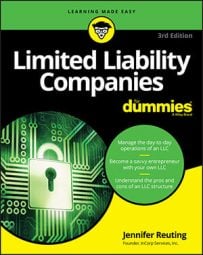Because LLCs (limited liability companies) are allowed to elect pretty much any tax status that suits them, the federal returns, information statements, and notices that they are required to file each year vary accordingly. An LLC can choose the following types of taxation: disregarded entity, partnership, corporation, or S corporation.
Disregarded entity taxation
Disregarded entity isn't so much an election as a default tax status for single-member LLCs. Single-member LLCs don't qualify for partnership taxation because no partners exist, so they're automatically subject to this form of taxation unless they elect corporation or S corporation tax status.
This form of taxation can actually be beneficial for some real estate and investment transactions. When considered a disregarded entity by the IRS, your company is treated as if it doesn't exist and you're taxed simply as an individual (or as a sole proprietorship, to be exact). This arrangement can be beneficial when executing tax credits, deductions, and strategies that only apply to individuals, such as mortgage interest deductions and special exception rules in a 1031 exchange of real estate.
Partnership taxation
Partnership taxation is the default tax status for limited liability companies with more than one member. It's a form of pass-through taxation. The primary benefit of partnership taxation over other forms of pass-through taxation is that, assuming your primary intention isn't tax avoidance; you can vary the profit and loss allocations to the partners. Additionally, recourse loans are, for the most part, deductible to the members who guarantee them.
Corporation taxation
The corporate tax status differs dramatically from all others. It's the only non-pass-through form of taxation an LLC can elect. The revenues and expenses, and thus the profits and losses, of the company do not pass through to the members, but instead are retained in the company and taxed at the applicable corporate income tax rate. Because the corporation tax rate is generally lower than what an individual pays, this status can often be beneficial.
Additionally, when a member sells his interests in the company, the profit from that sale is subject to a very favorable long-term capital gains rate. This can result in substantial tax savings. The major drawback of corporate taxation, though, occurs when ordinary profits (called dividends) are removed by the members, causing a double-taxation scenario.
S corporation taxation
The corporation's answer to pass-through taxation, S corporation tax status came about when small, closely held businesses (such as independent contractors) needed the ability to operate under the liability protection of a corporation but without the heavy tax and regulatory burden that comes with the standard corporation. Note that S corporation is not an entity type, but instead simply a tax election that can be made by either a corporation or an LLC.
The S corporation's claim to fame is the members' ability to hire themselves and pay themselves a salary. Although the resulting tax burden is ultimately equal to the income tax and self-employment tax they would pay with partnership taxation, the members only pay income tax on amounts over the salary they pay themselves, as opposed to members subject to partnership taxation who have to pay income tax and self-employment tax on all profits over their salary. Obviously, you can't just pay yourself $1 and be done with it. The IRS stipulates that your salary must be consistent with others in your industry and your position.

